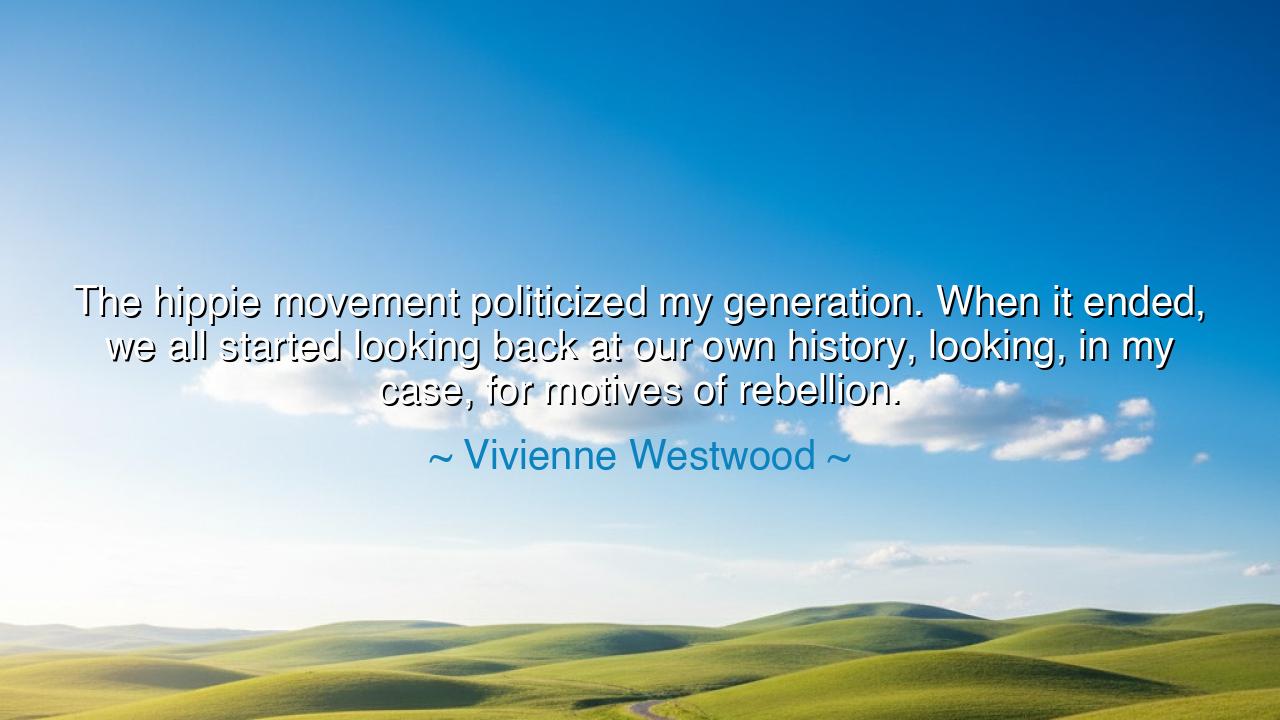
The hippie movement politicized my generation. When it ended, we
The hippie movement politicized my generation. When it ended, we all started looking back at our own history, looking, in my case, for motives of rebellion.






In the words of Vivienne Westwood, the queen of rebellion and the seamstress of revolution, we hear a truth that stirs both memory and fire: “The hippie movement politicized my generation. When it ended, we all started looking back at our own history, looking, in my case, for motives of rebellion.” These words are not mere nostalgia; they are a reflection on the eternal cycle of awakening — how each generation inherits both the dreams and disillusionments of the one before it. Westwood, who wove rebellion into fabric and turned fashion into protest, speaks here of the moment when innocence gives way to consciousness, and when style becomes a language for the soul’s defiance.
The origin of this reflection lies in the turbulent decades of the 1960s and 1970s — an age when youth across the Western world rose up in search of freedom, peace, and authenticity. The hippie movement, born amid the fires of war and the hunger for peace, sought to reject the machinery of conformity and the greed of modern society. It was an uprising not of weapons, but of flowers and song, of long hair and long dreams. Yet, as Westwood reminds us, when that movement faded, its spirit did not vanish — it transformed. The generation it had awakened could not return to sleep. They began to look back at their history, to examine the chains of culture, class, and empire that had shaped them, and to ask: Why must we obey?
For Westwood, that question became a calling. As the hippie ideal gave way to cynicism and disillusionment, she found in rebellion a new form of truth. Through the creation of punk fashion in the streets of London, she turned anger into art. Torn fabrics, safety pins, slogans on shirts — these became her weapons. Her motives of rebellion were not born of chaos, but of clarity. Where others saw decay, she saw renewal; where others saw ugliness, she saw honesty. Her rebellion was not mindless destruction — it was design with defiance, a visual protest against the numbness of her time.
This transformation — from dream to defiance, from peace to protest — has been seen throughout human history. When the idealism of one movement fades, a deeper awakening often follows. Consider the story of the French Revolution. It began with lofty visions of liberty and fraternity, but when those dreams collided with the hard stone of reality, a more radical fire was born — one that tore down monarchies and remade the world. So too with Westwood’s generation: the peace and love of the hippies gave birth to the rage and reason of the punk era. From the ashes of one dream rose the question that defines every age — how can we live truthfully in a world that insists on falsehood?
When Westwood says her generation was politicized, she does not mean they learned party politics or slogans — she means they were awakened to the awareness of power. They saw how systems shape lives, how culture molds obedience, how beauty itself can become a tool of control. And in response, she and others like her sought to reclaim expression as an act of freedom. For her, fashion became not vanity, but voice — a way to challenge, to mock, to redefine. The motives of rebellion she sought were not mere anger, but purpose: a rebellion of ideas, of aesthetics, of conscience.
The wisdom in her words is timeless: that rebellion, when rooted in reflection, becomes creation. It is not enough to reject what exists; one must understand it. Westwood and her peers looked backward not to live in the past, but to uncover the roots of their own oppression, to find in history the patterns that repeat, and to break them. True rebellion is born not from rage alone, but from remembrance — from knowing what came before and daring to imagine what could come next.
So, O seeker of authenticity, learn this lesson from Vivienne Westwood’s life and words: when the movements of your time fade, do not despair. Their spirit still lives within you, waiting to be reborn in new form. Look backward, not with nostalgia, but with curiosity. Ask what chains still bind your generation — and then design your rebellion. Let your art, your work, your speech, your being become your protest. Remember that rebellion is not destruction, but renewal, and that the truest revolution begins not in the streets, but in the soul.
For as Westwood teaches, every generation must rediscover its motives of rebellion — not for chaos, but for change; not for ego, but for truth. The hippies dreamed of peace; the punks demanded honesty. And so must we, in our own age of confusion and noise, learn again how to rebel with purpose — to create a new harmony from the discord, a new world from the courage to question the old.






AAdministratorAdministrator
Welcome, honored guests. Please leave a comment, we will respond soon